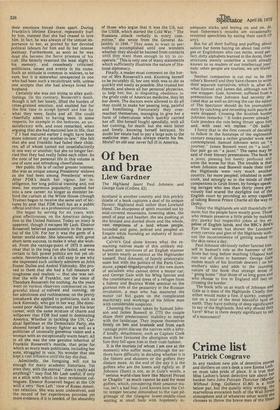Of ben and brae
Llew Gardner
The Highland Jaunt Paul Johnson and George Gale (Collins. £2) Scotland is another country and this prickly thistle of a book captures a deal of its unique flavour. Highland malt rather than Lowland blend. The sharpness of spirit rounded out by mist-covered mountains, towering skies, the smell of peat and heather, the sea pushing at the bruised and dunted shore and the whole,
vast emptiness of a land whose people,
hounded and gone, policed and peopled an Empire while founding an industry of Scott ish schmaltz.
Calvin's God alone knows what the remaining natives made of this unlikely redhaired pair: survivors of an English manner of letters nearly as extinct as the Highlander himself. Paul Johnson, of faintly aristocratic mien but with the politics of the Paris Commune, a papal-tingedprophet of the new dawn of socialism who cannot drive a motor car; and George Gale with his Whig fancies and the countenance and dress of a refugee from a Sidney and Beatrice Webb seminar on the glorious role of the peasantry in the Russian revolution, a man who has mastered the motor car but gazes on the complicated machinery and workings of his fellow man with considerable suspicion.
Choosing the route taken by Samuel Johnson and James Boswell in 1773 the couple share their predecessors' inability, to merge with the landscape. They impose themselves firmly on ben and braeside and from each vantage point discuss the natives with a lofty, if kindly, detachment; such as Captain Cook must have favoured the aborigines with before they fell upon him in their rude fashion.
It is the tourists (of whom I am one at the moment) who suffer most, although the au
thors have difficulty in deciding whether it is the fishers and shooters or the golfers they disdain more. At the end of the day it is the golfers who are the losers and rightly so. If Johnson (Sam) is not, as in Gale's words, a "serious world-class bore like Marcel Proust or Chaplin" as much cannot be said for most golfers, which, considering their amateur sta tus, isn't a bad feat. Lord knows how the Celtic temper became diminished to the vast pilgrimage of the Glasgow lower-middle-class smiting at small balls with hopelessly in adequate sticks and boring on and on. At least fishermen's mouths are occasionally rendered speechless by eating their catch (if any). But for all their huffing and puffing about saloon bar bores baying on about tied cottages or Englishmen who can recite, word perfect, dirty alphabets learned in the dorm, their strictures merely underline a truth already known to us readers of our intellectual journals: other people are tourists, we are travellers.
Neither companion is cut out to be the other's Boswell and they have chosen to write their separate narratives, which is, after all. what Samuel and James did, although not in one wrapper. Gale, however, suffered from a premonition that Johnson had secretly decided that as well as driving the car the editor of The Spectator should do his journalistic duty by catching and recording such pearls as were dropped. Crossing the Scottish border Johnson remarks: "It looks poorer already." Gale ponders the role being thrust upon him and, with neat wit replies: "Oh balls." I fancy that in the first conceit of deciding to follow in the footsteps of the eighteenth century essayists a rather grander work was contemplated. Samuel Johnson went on "
• journey," James Boswell went on "a tour. Our pair go on "a jaunt." The same may be said of their literary pretensions. The book is a jaunt, pleasing but barely profound and none the worse for that. The trouble is that when Johnson and Boswell made their tour the Highlands were very much another country, far more peopled; inhabited in some truth, and strongly so in the minds of their companions in Grub Street, by foreign-speaking savages who less than thirty years previously had scared the daylights out of the English court by providing an army capable of taking Bonnie Prince Charlie all the way to Derby.
Today the Highlands are still thankfully remote, but the people have mostly gone. Those who remain preserve a little pride by making dry, pawky but respectful jokes at the expense of English lairds, and the BBC's Bird's Eye View series has shown the Londoner every crevice and glen of the Highlands without the inconvenience of getting soaked to the skin twice a day.
Paul Johnson obviously rather fancied himself in Samuel's role as the hammer of the Scots but long before reaching Ullapool had run out of Scots to hammer. George Gale makes much of his Scottish descent ( on his mother's side) and adds to the jaunting nature of the book that strange sense of "going home" that those of us long gone and who choose to live in England still feel on crossing the border.
The book tells us as much of Johnson and Gale as it does of the Highlands: Chiefly that
either would make a fine, if quirky, compan° ion on a tour of the most beautiful land on earth. They have nothing of deep significance
to say of the Highlands. And why should they have? What is there deeply significant to saY. of a monument?


































 Previous page
Previous page